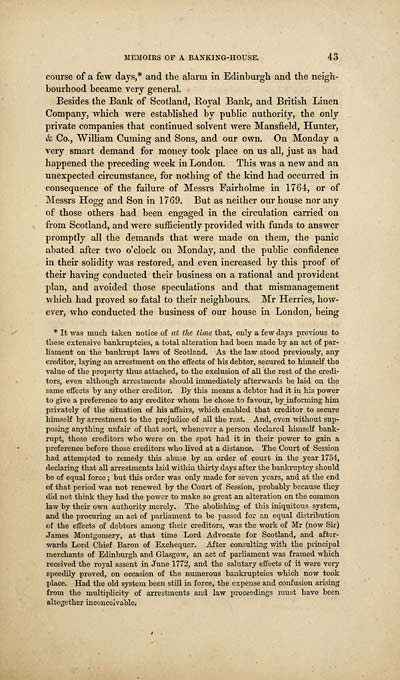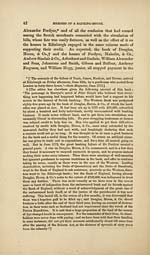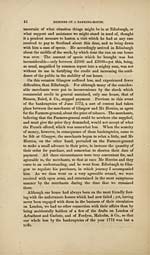Memoirs of a banking house
(61) Page 43
Download files
Complete book:
Individual page:
Thumbnail gallery: Grid view | List view

MEMOIRS OF A BANKING-HOUSE. 43
course of a few days,* and the alarm in Edinburgh and the neigh-
bourhood became very general.
Besides the Bank of Scotland, Royal Bank, and British Linen
Company, which were established by public authority, the only
private companies that continued solvent were Mansfield, Hunter,
& Co., William Cuming and Sons, and our own. On Monday a
very smart demand for money took place on us all, just as had
happened the preceding week in London. This was a new and an
unexpected circumstance, for nothing of the kind had occurred in
consequence of the failure of Messrs Fairholme in 1764, or of
Messrs Hogg and Son in 1769. But as neither our house nor any
of those others had been engaged in the circulation carried on
from Scotland, and were sufficiently provided with funds to answer
promptly all the demands that were made on them, the panic
abated after two o'clock on Monday, and the public confidence
in their solidity was restored, and even increased by this proof of
their having conducted their business on a rational and provident
plan, and avoided those speculations and that mismanagement
which had proved so fatal to their neighbours. Mr Herries, how-
ever, who conducted the business of our house in London, being
* It was much taken notice of at the time that, only a few days previoiis to
these extensive bankruptcies, a total alteration had been made by an act of par-
liament on the bankrupt laws of Scotland. As the law stood previously, any
creditor, laying an arrestment on the effects of his debtor, secured to himself the
value of the property thus attached, to the exclusion of all the rest of the credi-
tors, even although arrestments should mimediately afterwai'ds be laid on the
same effects by any other creditor. By tliis means a debtor had it in his power
to give a preference to any creditor whom he chose to favour, by informing him
privately of the situation of his affairs, which enabled that creditor to secure
himself by arrestment to the prejudice of all the rest. And, even without sup-
posing anj-thing unfair of that sort, whenever a person declared himself bank-
nipt, those creditors wlio were on the spot had it in their power to gain a
preference before those creditors who lived at a distance. The Court of Session
had attempted to remedy this abuse by an order of court in the year 1754,
declaring that all arrestments laid within thirty days after the bankruptcy should
be of equal force ; but this order was only made for seven years, and at the end
of that period was not renewed by the Court of Session, probably because they
did not tliink they had the power to make so great an alteration on the common
law by theii- own authority merely. The abolishing of this iniquitous system,
and the procuring an act of parliament to be passed for an equal distribution
of the effects of debtors among their creditors, was the work of Mr (now Sir)
James Montgomery, at that tinie Lord Advocate for Scotland, and after-
wards Lord Chief Baron of Exchequer. After consulting -with the principal
merchants of Edinburgh and Glasgow, an act of parliament was framed which
received the royal assent in June 1772, and the sahitary effects of it were very
speedily proved, on occasion of the numerous bankruptcies which now took
place. Had the old system been still in force, the expense and confusion arising
from the multipHcity of arrestments and law proceedings must have been
altogether inconceivable.
course of a few days,* and the alarm in Edinburgh and the neigh-
bourhood became very general.
Besides the Bank of Scotland, Royal Bank, and British Linen
Company, which were established by public authority, the only
private companies that continued solvent were Mansfield, Hunter,
& Co., William Cuming and Sons, and our own. On Monday a
very smart demand for money took place on us all, just as had
happened the preceding week in London. This was a new and an
unexpected circumstance, for nothing of the kind had occurred in
consequence of the failure of Messrs Fairholme in 1764, or of
Messrs Hogg and Son in 1769. But as neither our house nor any
of those others had been engaged in the circulation carried on
from Scotland, and were sufficiently provided with funds to answer
promptly all the demands that were made on them, the panic
abated after two o'clock on Monday, and the public confidence
in their solidity was restored, and even increased by this proof of
their having conducted their business on a rational and provident
plan, and avoided those speculations and that mismanagement
which had proved so fatal to their neighbours. Mr Herries, how-
ever, who conducted the business of our house in London, being
* It was much taken notice of at the time that, only a few days previoiis to
these extensive bankruptcies, a total alteration had been made by an act of par-
liament on the bankrupt laws of Scotland. As the law stood previously, any
creditor, laying an arrestment on the effects of his debtor, secured to himself the
value of the property thus attached, to the exclusion of all the rest of the credi-
tors, even although arrestments should mimediately afterwai'ds be laid on the
same effects by any other creditor. By tliis means a debtor had it in his power
to give a preference to any creditor whom he chose to favour, by informing him
privately of the situation of his affairs, which enabled that creditor to secure
himself by arrestment to the prejudice of all the rest. And, even without sup-
posing anj-thing unfair of that sort, whenever a person declared himself bank-
nipt, those creditors wlio were on the spot had it in their power to gain a
preference before those creditors who lived at a distance. The Court of Session
had attempted to remedy this abuse by an order of court in the year 1754,
declaring that all arrestments laid within thirty days after the bankruptcy should
be of equal force ; but this order was only made for seven years, and at the end
of that period was not renewed by the Court of Session, probably because they
did not tliink they had the power to make so great an alteration on the common
law by theii- own authority merely. The abolishing of this iniquitous system,
and the procuring an act of parliament to be passed for an equal distribution
of the effects of debtors among their creditors, was the work of Mr (now Sir)
James Montgomery, at that tinie Lord Advocate for Scotland, and after-
wards Lord Chief Baron of Exchequer. After consulting -with the principal
merchants of Edinburgh and Glasgow, an act of parliament was framed which
received the royal assent in June 1772, and the sahitary effects of it were very
speedily proved, on occasion of the numerous bankruptcies which now took
place. Had the old system been still in force, the expense and confusion arising
from the multipHcity of arrestments and law proceedings must have been
altogether inconceivable.
Set display mode to:
![]() Universal Viewer |
Universal Viewer | ![]() Mirador |
Large image | Transcription
Mirador |
Large image | Transcription
Images and transcriptions on this page, including medium image downloads, may be used under the Creative Commons Attribution 4.0 International Licence unless otherwise stated. ![]()
| Histories of Scottish families > Memoirs of a banking house > (61) Page 43 |
|---|
| Permanent URL | https://digital.nls.uk/94956834 |
|---|
| Description | A selection of almost 400 printed items relating to the history of Scottish families, mostly dating from the 19th and early 20th centuries. Includes memoirs, genealogies and clan histories, with a few produced by emigrant families. The earliest family history goes back to AD 916. |
|---|

